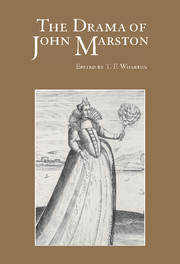Book contents
- Frontmatter
- Contents
- Notes on contributors
- Acknowledgements
- Note on the text
- Introduction
- 1 John Marston at the ‘mart of woe’: the Antonio plays
- 2 John Marston: a theatrical perspective
- 3 Varieties of fantasy in What You Will
- 4 Safety in fiction: Marston's recreational poetics
- 5 Insatiate punning in Marston's courtesan plays
- 6 Touching the self: masturbatory Marston
- 7 ‘Two parts in one’: Marston and masculinity
- 8 The Malcontent: hunting the letter
- 9 The Dutch Courtesan and the profits of translation
- 10 Sexual politics in Marston's The Malcontent
- 11 Marston: censure, censorship, and free speech
- 12 Ill-mannered Marston
- Index
12 - Ill-mannered Marston
Published online by Cambridge University Press: 01 October 2009
- Frontmatter
- Contents
- Notes on contributors
- Acknowledgements
- Note on the text
- Introduction
- 1 John Marston at the ‘mart of woe’: the Antonio plays
- 2 John Marston: a theatrical perspective
- 3 Varieties of fantasy in What You Will
- 4 Safety in fiction: Marston's recreational poetics
- 5 Insatiate punning in Marston's courtesan plays
- 6 Touching the self: masturbatory Marston
- 7 ‘Two parts in one’: Marston and masculinity
- 8 The Malcontent: hunting the letter
- 9 The Dutch Courtesan and the profits of translation
- 10 Sexual politics in Marston's The Malcontent
- 11 Marston: censure, censorship, and free speech
- 12 Ill-mannered Marston
- Index
Summary
In 1986 the Royal Shakespeare Company opened the Swan Theatre. It is, the company stated, ‘a Jacobean-style playhouse staging the once popular but now rarely seen plays of Shakespeare's contemporaries during the period 1570–1750’. Since 1986 the RSC has staged many Elizabethan, Jacobean, and Restoration plays. Dramatists such as Christopher Marlowe, Thomas Heywood, Thomas Dekker, Ben Jonson, Cyril Tourneur, Thomas Middleton, John Ford, William Wycherley, and Aphra Behn have all had revivals of work in the Swan but there has been no place for John Marston; not a single performance of one of his plays has been staged. Yet arguably, for a brief period of time around 1602–6, Marston was one of the most controversial playwrights in London, competing in popularity with Shakespeare. It can be conjectured that Shakespeare's musings on theatrical competition in Hamlet refer to an extent at least to Marston's plays performed by the boy actors at St Paul's:
there is, sir, an eyrie of children, little eyases, that cry out on the top of question and are most tyrannically clapped for't. These are now the fashion, and so berattle the common stages – so they call them – that many wearing rapiers are afraid of goose-quills, and dare scarce come thither.
The Malcontent (1602[?]/1604[?]) was such an attraction that it was revised in 1604 by John Webster for a production at the Globe.
- Type
- Chapter
- Information
- The Drama of John MarstonCritical Re-Visions, pp. 212 - 230Publisher: Cambridge University PressPrint publication year: 2001



